Food Industry
Personal Care Products
Biofuels
Animal Feed
Industrial Lubricants
Crude Palm Oil
Refined Palm Oil
Palm Kernel Oil
Fractionated Palm Oil
Direct Sales
Retail
E-commerce
Wholesale
Food Processing
Cosmetics Manufacturing
Energy Production
Chemical Manufacturing
North America
Europe
South America
Asia Pacific
Middle East and Africa
North America Outlook (USD Billion, 2019-2035)
North America Palm Oil Market by Application Type
Food Industry
Personal Care Products
Biofuels
Animal Feed
Industrial Lubricants
North America Palm Oil Market by Form Type
Crude Palm Oil
Refined Palm Oil
Palm Kernel Oil
Fractionated Palm Oil
North America Palm Oil Market by Distribution Channel Type
Direct Sales
Retail
E-commerce
Wholesale
North America Palm Oil Market by End Use Type
Food Processing
Cosmetics Manufacturing
Energy Production
Chemical Manufacturing
North America Palm Oil Market by Regional Type
US
Canada
US Outlook (USD Billion, 2019-2035)
US Palm Oil Market by Application Type
Food Industry
Personal Care Products
Biofuels
Animal Feed
Industrial Lubricants
US Palm Oil Market by Form Type
Crude Palm Oil
Refined Palm Oil
Palm Kernel Oil
Fractionated Palm Oil
US Palm Oil Market by Distribution Channel Type
Direct Sales
Retail
E-commerce
Wholesale
US Palm Oil Market by End Use Type
Food Processing
Cosmetics Manufacturing
Energy Production
Chemical Manufacturing
CANADA Outlook (USD Billion, 2019-2035)
CANADA Palm Oil Market by Application Type
Food Industry
Personal Care Products
Biofuels
Animal Feed
Industrial Lubricants
CANADA Palm Oil Market by Form Type
Crude Palm Oil
Refined Palm Oil
Palm Kernel Oil
Fractionated Palm Oil
CANADA Palm Oil Market by Distribution Channel Type
Direct Sales
Retail
E-commerce
Wholesale
CANADA Palm Oil Market by End Use Type
Food Processing
Cosmetics Manufacturing
Energy Production
Chemical Manufacturing
Europe Outlook (USD Billion, 2019-2035)
Europe Palm Oil Market by Application Type
Food Industry
Personal Care Products
Biofuels
Animal Feed
Industrial Lubricants
Europe Palm Oil Market by Form Type
Crude Palm Oil
Refined Palm Oil
Palm Kernel Oil
Fractionated Palm Oil
Europe Palm Oil Market by Distribution Channel Type
Direct Sales
Retail
E-commerce
Wholesale
Europe Palm Oil Market by End Use Type
Food Processing
Cosmetics Manufacturing
Energy Production
Chemical Manufacturing
Europe Palm Oil Market by Regional Type
Germany
UK
France
Russia
Italy
Spain
Rest of Europe
GERMANY Outlook (USD Billion, 2019-2035)
GERMANY Palm Oil Market by Application Type
Food Industry
Personal Care Products
Biofuels
Animal Feed
Industrial Lubricants
GERMANY Palm Oil Market by Form Type
Crude Palm Oil
Refined Palm Oil
Palm Kernel Oil
Fractionated Palm Oil
GERMANY Palm Oil Market by Distribution Channel Type
Direct Sales
Retail
E-commerce
Wholesale
GERMANY Palm Oil Market by End Use Type
Food Processing
Cosmetics Manufacturing
Energy Production
Chemical Manufacturing
UK Outlook (USD Billion, 2019-2035)
UK Palm Oil Market by Application Type
Food Industry
Personal Care Products
Biofuels
Animal Feed
Industrial Lubricants
UK Palm Oil Market by Form Type
Crude Palm Oil
Refined Palm Oil
Palm Kernel Oil
Fractionated Palm Oil
UK Palm Oil Market by Distribution Channel Type
Direct Sales
Retail
E-commerce
Wholesale
UK Palm Oil Market by End Use Type
Food Processing
Cosmetics Manufacturing
Energy Production
Chemical Manufacturing
FRANCE Outlook (USD Billion, 2019-2035)
FRANCE Palm Oil Market by Application Type
Food Industry
Personal Care Products
Biofuels
Animal Feed
Industrial Lubricants
FRANCE Palm Oil Market by Form Type
Crude Palm Oil
Refined Palm Oil
Palm Kernel Oil
Fractionated Palm Oil
FRANCE Palm Oil Market by Distribution Channel Type
Direct Sales
Retail
E-commerce
Wholesale
FRANCE Palm Oil Market by End Use Type
Food Processing
Cosmetics Manufacturing
Energy Production
Chemical Manufacturing
RUSSIA Outlook (USD Billion, 2019-2035)
RUSSIA Palm Oil Market by Application Type
Food Industry
Personal Care Products
Biofuels
Animal Feed
Industrial Lubricants
RUSSIA Palm Oil Market by Form Type
Crude Palm Oil
Refined Palm Oil
Palm Kernel Oil
Fractionated Palm Oil
RUSSIA Palm Oil Market by Distribution Channel Type
Direct Sales
Retail
E-commerce
Wholesale
RUSSIA Palm Oil Market by End Use Type
Food Processing
Cosmetics Manufacturing
Energy Production
Chemical Manufacturing
ITALY Outlook (USD Billion, 2019-2035)
ITALY Palm Oil Market by Application Type
Food Industry
Personal Care Products
Biofuels
Animal Feed
Industrial Lubricants
ITALY Palm Oil Market by Form Type
Crude Palm Oil
Refined Palm Oil
Palm Kernel Oil
Fractionated Palm Oil
ITALY Palm Oil Market by Distribution Channel Type
Direct Sales
Retail
E-commerce
Wholesale
ITALY Palm Oil Market by End Use Type
Food Processing
Cosmetics Manufacturing
Energy Production
Chemical Manufacturing
SPAIN Outlook (USD Billion, 2019-2035)
SPAIN Palm Oil Market by Application Type
Food Industry
Personal Care Products
Biofuels
Animal Feed
Industrial Lubricants
SPAIN Palm Oil Market by Form Type
Crude Palm Oil
Refined Palm Oil
Palm Kernel Oil
Fractionated Palm Oil
SPAIN Palm Oil Market by Distribution Channel Type
Direct Sales
Retail
E-commerce
Wholesale
SPAIN Palm Oil Market by End Use Type
Food Processing
Cosmetics Manufacturing
Energy Production
Chemical Manufacturing
REST OF EUROPE Outlook (USD Billion, 2019-2035)
REST OF EUROPE Palm Oil Market by Application Type
Food Industry
Personal Care Products
Biofuels
Animal Feed
Industrial Lubricants
REST OF EUROPE Palm Oil Market by Form Type
Crude Palm Oil
Refined Palm Oil
Palm Kernel Oil
Fractionated Palm Oil
REST OF EUROPE Palm Oil Market by Distribution Channel Type
Direct Sales
Retail
E-commerce
Wholesale
REST OF EUROPE Palm Oil Market by End Use Type
Food Processing
Cosmetics Manufacturing
Energy Production
Chemical Manufacturing
APAC Outlook (USD Billion, 2019-2035)
APAC Palm Oil Market by Application Type
Food Industry
Personal Care Products
Biofuels
Animal Feed
Industrial Lubricants
APAC Palm Oil Market by Form Type
Crude Palm Oil
Refined Palm Oil
Palm Kernel Oil
Fractionated Palm Oil
APAC Palm Oil Market by Distribution Channel Type
Direct Sales
Retail
E-commerce
Wholesale
APAC Palm Oil Market by End Use Type
Food Processing
Cosmetics Manufacturing
Energy Production
Chemical Manufacturing
APAC Palm Oil Market by Regional Type
China
India
Japan
South Korea
Malaysia
Thailand
Indonesia
Rest of APAC
CHINA Outlook (USD Billion, 2019-2035)
CHINA Palm Oil Market by Application Type
Food Industry
Personal Care Products
Biofuels
Animal Feed
Industrial Lubricants
CHINA Palm Oil Market by Form Type
Crude Palm Oil
Refined Palm Oil
Palm Kernel Oil
Fractionated Palm Oil
CHINA Palm Oil Market by Distribution Channel Type
Direct Sales
Retail
E-commerce
Wholesale
CHINA Palm Oil Market by End Use Type
Food Processing
Cosmetics Manufacturing
Energy Production
Chemical Manufacturing
INDIA Outlook (USD Billion, 2019-2035)
INDIA Palm Oil Market by Application Type
Food Industry
Personal Care Products
Biofuels
Animal Feed
Industrial Lubricants
INDIA Palm Oil Market by Form Type
Crude Palm Oil
Refined Palm Oil
Palm Kernel Oil
Fractionated Palm Oil
INDIA Palm Oil Market by Distribution Channel Type
Direct Sales
Retail
E-commerce
Wholesale
INDIA Palm Oil Market by End Use Type
Food Processing
Cosmetics Manufacturing
Energy Production
Chemical Manufacturing
JAPAN Outlook (USD Billion, 2019-2035)
JAPAN Palm Oil Market by Application Type
Food Industry
Personal Care Products
Biofuels
Animal Feed
Industrial Lubricants
JAPAN Palm Oil Market by Form Type
Crude Palm Oil
Refined Palm Oil
Palm Kernel Oil
Fractionated Palm Oil
JAPAN Palm Oil Market by Distribution Channel Type
Direct Sales
Retail
E-commerce
Wholesale
JAPAN Palm Oil Market by End Use Type
Food Processing
Cosmetics Manufacturing
Energy Production
Chemical Manufacturing
SOUTH KOREA Outlook (USD Billion, 2019-2035)
SOUTH KOREA Palm Oil Market by Application Type
Food Industry
Personal Care Products
Biofuels
Animal Feed
Industrial Lubricants
SOUTH KOREA Palm Oil Market by Form Type
Crude Palm Oil
Refined Palm Oil
Palm Kernel Oil
Fractionated Palm Oil
SOUTH KOREA Palm Oil Market by Distribution Channel Type
Direct Sales
Retail
E-commerce
Wholesale
SOUTH KOREA Palm Oil Market by End Use Type
Food Processing
Cosmetics Manufacturing
Energy Production
Chemical Manufacturing
MALAYSIA Outlook (USD Billion, 2019-2035)
MALAYSIA Palm Oil Market by Application Type
Food Industry
Personal Care Products
Biofuels
Animal Feed
Industrial Lubricants
MALAYSIA Palm Oil Market by Form Type
Crude Palm Oil
Refined Palm Oil
Palm Kernel Oil
Fractionated Palm Oil
MALAYSIA Palm Oil Market by Distribution Channel Type
Direct Sales
Retail
E-commerce
Wholesale
MALAYSIA Palm Oil Market by End Use Type
Food Processing
Cosmetics Manufacturing
Energy Production
Chemical Manufacturing
THAILAND Outlook (USD Billion, 2019-2035)
THAILAND Palm Oil Market by Application Type
Food Industry
Personal Care Products
Biofuels
Animal Feed
Industrial Lubricants
THAILAND Palm Oil Market by Form Type
Crude Palm Oil
Refined Palm Oil
Palm Kernel Oil
Fractionated Palm Oil
THAILAND Palm Oil Market by Distribution Channel Type
Direct Sales
Retail
E-commerce
Wholesale
THAILAND Palm Oil Market by End Use Type
Food Processing
Cosmetics Manufacturing
Energy Production
Chemical Manufacturing
INDONESIA Outlook (USD Billion, 2019-2035)
INDONESIA Palm Oil Market by Application Type
Food Industry
Personal Care Products
Biofuels
Animal Feed
Industrial Lubricants
INDONESIA Palm Oil Market by Form Type
Crude Palm Oil
Refined Palm Oil
Palm Kernel Oil
Fractionated Palm Oil
INDONESIA Palm Oil Market by Distribution Channel Type
Direct Sales
Retail
E-commerce
Wholesale
INDONESIA Palm Oil Market by End Use Type
Food Processing
Cosmetics Manufacturing
Energy Production
Chemical Manufacturing
REST OF APAC Outlook (USD Billion, 2019-2035)
REST OF APAC Palm Oil Market by Application Type
Food Industry
Personal Care Products
Biofuels
Animal Feed
Industrial Lubricants
REST OF APAC Palm Oil Market by Form Type
Crude Palm Oil
Refined Palm Oil
Palm Kernel Oil
Fractionated Palm Oil
REST OF APAC Palm Oil Market by Distribution Channel Type
Direct Sales
Retail
E-commerce
Wholesale
REST OF APAC Palm Oil Market by End Use Type
Food Processing
Cosmetics Manufacturing
Energy Production
Chemical Manufacturing
South America Outlook (USD Billion, 2019-2035)
South America Palm Oil Market by Application Type
Food Industry
Personal Care Products
Biofuels
Animal Feed
Industrial Lubricants
South America Palm Oil Market by Form Type
Crude Palm Oil
Refined Palm Oil
Palm Kernel Oil
Fractionated Palm Oil
South America Palm Oil Market by Distribution Channel Type
Direct Sales
Retail
E-commerce
Wholesale
South America Palm Oil Market by End Use Type
Food Processing
Cosmetics Manufacturing
Energy Production
Chemical Manufacturing
South America Palm Oil Market by Regional Type
Brazil
Mexico
Argentina
Rest of South America
BRAZIL Outlook (USD Billion, 2019-2035)
BRAZIL Palm Oil Market by Application Type
Food Industry
Personal Care Products
Biofuels
Animal Feed
Industrial Lubricants
BRAZIL Palm Oil Market by Form Type
Crude Palm Oil
Refined Palm Oil
Palm Kernel Oil
Fractionated Palm Oil
BRAZIL Palm Oil Market by Distribution Channel Type
Direct Sales
Retail
E-commerce
Wholesale
BRAZIL Palm Oil Market by End Use Type
Food Processing
Cosmetics Manufacturing
Energy Production
Chemical Manufacturing
MEXICO Outlook (USD Billion, 2019-2035)
MEXICO Palm Oil Market by Application Type
Food Industry
Personal Care Products
Biofuels
Animal Feed
Industrial Lubricants
MEXICO Palm Oil Market by Form Type
Crude Palm Oil
Refined Palm Oil
Palm Kernel Oil
Fractionated Palm Oil
MEXICO Palm Oil Market by Distribution Channel Type
Direct Sales
Retail
E-commerce
Wholesale
MEXICO Palm Oil Market by End Use Type
Food Processing
Cosmetics Manufacturing
Energy Production
Chemical Manufacturing
ARGENTINA Outlook (USD Billion, 2019-2035)
ARGENTINA Palm Oil Market by Application Type
Food Industry
Personal Care Products
Biofuels
Animal Feed
Industrial Lubricants
ARGENTINA Palm Oil Market by Form Type
Crude Palm Oil
Refined Palm Oil
Palm Kernel Oil
Fractionated Palm Oil
ARGENTINA Palm Oil Market by Distribution Channel Type
Direct Sales
Retail
E-commerce
Wholesale
ARGENTINA Palm Oil Market by End Use Type
Food Processing
Cosmetics Manufacturing
Energy Production
Chemical Manufacturing
REST OF SOUTH AMERICA Outlook (USD Billion, 2019-2035)
REST OF SOUTH AMERICA Palm Oil Market by Application Type
Food Industry
Personal Care Products
Biofuels
Animal Feed
Industrial Lubricants
REST OF SOUTH AMERICA Palm Oil Market by Form Type
Crude Palm Oil
Refined Palm Oil
Palm Kernel Oil
Fractionated Palm Oil
REST OF SOUTH AMERICA Palm Oil Market by Distribution Channel Type
Direct Sales
Retail
E-commerce
Wholesale
REST OF SOUTH AMERICA Palm Oil Market by End Use Type
Food Processing
Cosmetics Manufacturing
Energy Production
Chemical Manufacturing
MEA Outlook (USD Billion, 2019-2035)
MEA Palm Oil Market by Application Type
Food Industry
Personal Care Products
Biofuels
Animal Feed
Industrial Lubricants
MEA Palm Oil Market by Form Type
Crude Palm Oil
Refined Palm Oil
Palm Kernel Oil
Fractionated Palm Oil
MEA Palm Oil Market by Distribution Channel Type
Direct Sales
Retail
E-commerce
Wholesale
MEA Palm Oil Market by End Use Type
Food Processing
Cosmetics Manufacturing
Energy Production
Chemical Manufacturing
MEA Palm Oil Market by Regional Type
GCC Countries
South Africa
Rest of MEA
GCC COUNTRIES Outlook (USD Billion, 2019-2035)
GCC COUNTRIES Palm Oil Market by Application Type
Food Industry
Personal Care Products
Biofuels
Animal Feed
Industrial Lubricants
GCC COUNTRIES Palm Oil Market by Form Type
Crude Palm Oil
Refined Palm Oil
Palm Kernel Oil
Fractionated Palm Oil
GCC COUNTRIES Palm Oil Market by Distribution Channel Type
Direct Sales
Retail
E-commerce
Wholesale
GCC COUNTRIES Palm Oil Market by End Use Type
Food Processing
Cosmetics Manufacturing
Energy Production
Chemical Manufacturing
SOUTH AFRICA Outlook (USD Billion, 2019-2035)
SOUTH AFRICA Palm Oil Market by Application Type
Food Industry
Personal Care Products
Biofuels
Animal Feed
Industrial Lubricants
SOUTH AFRICA Palm Oil Market by Form Type
Crude Palm Oil
Refined Palm Oil
Palm Kernel Oil
Fractionated Palm Oil
SOUTH AFRICA Palm Oil Market by Distribution Channel Type
Direct Sales
Retail
E-commerce
Wholesale
SOUTH AFRICA Palm Oil Market by End Use Type
Food Processing
Cosmetics Manufacturing
Energy Production
Chemical Manufacturing
REST OF MEA Outlook (USD Billion, 2019-2035)
REST OF MEA Palm Oil Market by Application Type
Food Industry
Personal Care Products
Biofuels
Animal Feed
Industrial Lubricants
REST OF MEA Palm Oil Market by Form Type
Crude Palm Oil
Refined Palm Oil
Palm Kernel Oil
Fractionated Palm Oil
REST OF MEA Palm Oil Market by Distribution Channel Type
Direct Sales
Retail
E-commerce
Wholesale
REST OF MEA Palm Oil Market by End Use Type
Food Processing
Cosmetics Manufacturing
Energy Production
Chemical Manufacturing


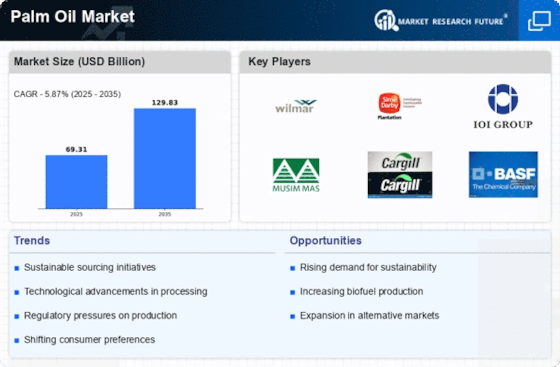
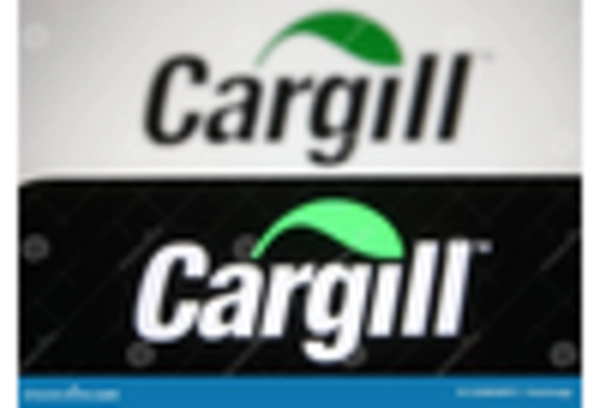
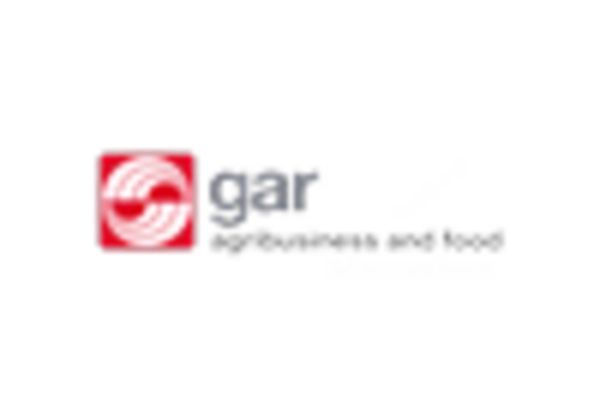
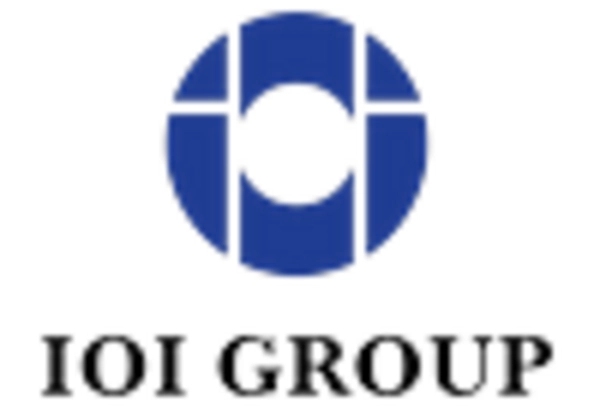

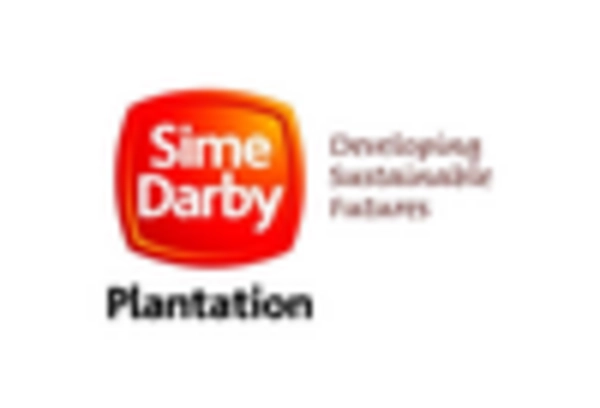
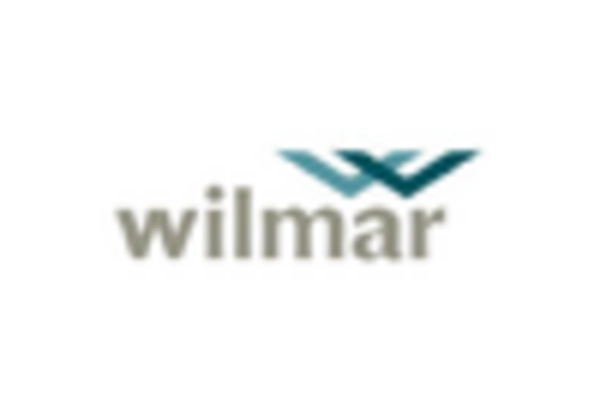









Leave a Comment